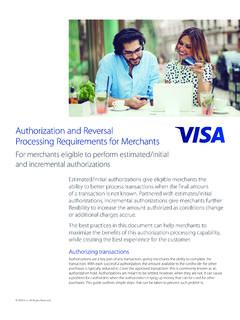Transcription of Improving Authorization Management for Transactions ... - Visa
1 Improving Authorization Managementfor Transactions with Stored CredentialsFor merchants, acquirers, payment facilitators, and staged digital wallet operators that process stored credential Transactions , and for all information provided in this guide allows all stakeholders to comply with the mandatory requirements and take advantage of the benefits of the stored credential Transaction framework. 2 Improving Authorization Management for Transactions with Stored CredentialsIntroduction ..3 What is a stored credential ? ..4 New Taxonomy for stored credential Transactions ..5 stored credential Terminology ..6 Summary of Requirements ..8 Global stored credential Transaction Framework Mandates.
2 9 Face-to-face Environment ..10 Card-absent Environment ..11 Use and Definition of Value C in the POS Environment Field ..12 Consent Agreement Provisions ..13 Additional Information ..14 Europe Additional Requirements ..15 For More Information ..15 Table of Contents3 Improving Authorization Management for Transactions with Stored CredentialsIntroductionVisa announced requirements for its stored credential Transaction framework, including mandates to identify initial storage and subsequent use of payment credentials . As the payment system has evolved, instances in which a transaction is initiated with a stored credential based on a cardholder s consent for future use have increased to significant levels.
3 Growth in digital commerce, together with the emergence of new business models, has increased the number of Transactions where a merchant or its agent, a payment facilitator (PF), or a staged digital wallet operator (SDWO) uses cardholders payment credentials ( , account details) that they previously stored for future purchases. Recognizing stored credential Transactions distinctly allows for greater visibility into the transaction risk, enabling robust processing and resulting in differential treatment. visa has defined Authorization data values to help identify initial storage and usage of stored payment credentials to enable differentiated is enhancing its rules and processing specifications to address a comprehensive list of scenarios where payment credentials are stored with the : Compliance with the stored credential Transaction framework is required to participate in Real Time visa Account Updater 2.
4 This service enables merchants to get updated card information as part of the Authorization message in real time, instead of the existing offline batch process. Benefits of Identifying Transactions as a Stored CredentialIdentifying stored credential Transactions specifically, allows for differentiated treatment through the Authorization approval process. The results are: Greater visibility of transaction risk levels for issuers Results in higher Authorization approval rates and completed sales Fewer customer complaints and improved cardholder experience Allows participation in Real Time visa Account Updater Service3 1 Merchant refers to a merchant or its agent, a payment facilitator, or a staged digital wallet operator.
5 2 Availability varies by Real Time visa Account Updater expands VAU into VisaNet and enables real-time updates as part of the standard purchase Authorization process. It eliminates the pre- Authorization step required by legacy VAU, thus eliminating the gap in time between current VAU and Authorization stored credential is information (including, but not limited to, an account number or payment token) that is stored by a merchant or its agent, a payment facilitator, or a staged digital wallet operator to process future Transactions . What is aStored Credential?Chargeback RulesNote:There is no impact to chargeback rules as a result of these stored credential updates. What is aStored Credential?
6 Chargeback Rules4 Improving Authorization Management for Transactions with Stored CredentialsA stored credential is information (including, but not limited to, an account number or payment token) that is stored by a merchant or its agent, PF, or SDWO to process future purchases for a cardholder. Payment credentials received by merchants from third parties including pass-through digital wallets that are not stored by the merchant, its agent, or PF are not considered stored credentials . For example, a payment credential received by a merchant on a purchase from visa Checkout and not stored by that merchant, its agent, or PF is not considered a stored credential is also not considered a stored credential when the merchant or its agent, PF, or SDWO stores the credential to complete a single transaction or a single purchase for a cardholder (including multiple authorizations related to that particular transaction).
7 For example, when a cardholder provides a payment credential to a hotel to cover future reservations and charges as part of the cardholder s membership profile, it is considered a stored credential . However, when the cardholder provides the payment credential to a hotel to cover charges related to a specific reservation only, it is is a stored credential ?Stored Credential5 Improving Authorization Management for Transactions with Stored CredentialsNew Taxonomy for stored credential TransactionsStored CredentialMerchant-inititatedTransaction s (MITs)ResubmissionIncrementalDelayed ChargesNo ShowReauthorizationIndustryPracticeInsta llmentsUnscheduled Credential on FileRecurringStandingInstructionCredenti al on FileCardholder-inititatedTransactions (CITs)6 Improving Authorization Management for Transactions with Stored CredentialsCardholder-initiated Transaction (CIT): A cardholder-initiated transaction is any transaction where the cardholder is actively participating in the transaction.
8 This can be either at a terminal in-store or through a checkout experience online, or with a stored credential . Credential on File CIT: A card-absent transaction initiated by the cardholder where the cardholder does not need to enter their card details as the merchant uses the payment credential previously stored by the cardholder to perform the transaction. Examples include a transaction using customer s merchant profi le or staged digital Transaction (MIT): Merchants commonly initiate MITs without the active participation of the cardholder to: Perform a transaction as a follow-up to a cardholder-initiated transaction (CIT) Perform a pre-agreed standing instruction from the cardholder for the provision of goods or servicesExamples of MITs include.
9 A hotel charge for mini-bar expenses tallied after the guest has checked out and closed the folio A subsequent recurring payment for a magazine subscription Digital payment made via an app to purchase goods or order services at customer s request such as ordering a ride or buying train tickets are not MITs but are cardholder-initiated as the cardholder actively participates in them. Industry-Specifi c business Practice MITs: MITs defi ned under this category are performed to fulfi ll a business practice as a follow-up to an original cardholder-merchant interaction that could not be completed with one single transaction. Not every industry practice merchant-initiated transaction is performed with a stored credential .
10 When the merchant or its agent, a payment facilitator, or a staged digital wallet operator stores the credential for a single transaction or a single purchase, it is not considered as a stored credential transaction. The following transaction types are industry-specifi c Transactions :Incremental: Incremental authorizations can be used to increase the total amount authorized if the authorized amount is insuffi cient. An incremental Authorization request may also be based on a revised estimate of what the cardholder may spend. Incremental authorizations do not replace the original Authorization they are additional to previously authorized amounts. The sum of all linked estimated and incremental authorizations represent the total amount authorized for a given transaction.












